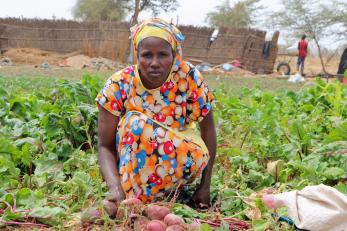Market gardeners thrive with clean energy in Senegal

In the community of Fass Ngom, 30 km from Saint-Louis in northern Senegal, Mercy Corps’ energy access platform Energy 4 Impact works in collaboration with ENERGIA to support women engaged in market gardening. Through the Foyré Rewbé 3.0 project (‘women & energy’ in the local Fulani language), which promotes equal access to clean energy for local economic growth and climate-smart development, local women are reaping the rewards of training in agroecological practices and the installation of solar equipment on their plots.
Agriculture is a vital economic activity in this region, but women, particularly those involved in market gardening, face enormous challenges. They have limited access to water, finance, and markets, and have historically been restricted to small plots. These constraints have hindered their ability to make a decent living from agriculture.
However, the market gardeners from Fass Ngom are now seizing the opportunity to achieve economic independence. Solar-powered pumping equipment has vastly improved their water access, enabling larger-scale cultivation and higher yields. Business management, leadership, entrepreneurship training, and agroecological practices have further boosted their productivity and income. Collaborative efforts through cooperatives have enhanced their bargaining power, expanded product range, and improved market access.
The adoption of clean energy has transformed their lives, significantly enhancing living conditions and overall wellbeing. Some have seen up to a 50% rise in production and over a 30% increase in income compared to previous agricultural seasons. Financial benefits are amplified by savings on fuel expenses previously spent on diesel generators. One of the market gardeners testifies:
We could spend upwards of 500,000 CFA (approximately $820) during each six-month campaign to buy diesel, and our production was not as high as now.
Solar equipment has also drastically reduced costs, enabling women to direct a greater proportion of their income towards family needs and education.
The transformational impact on households
The positive impact on their families' lives is striking. For example, Anta Yade doubled her onion production by switching from a diesel pump to a solar-powered one, allowing her to cultivate a larger area. Similarly, Aminata Seck has harvested 10 tons of onions this season, a remarkable 50% increase in production. For both women, the increased income enables them to afford better nutrition, education, and healthcare for their families.
Ndeye Fatou Gueye explains further, “If my child falls ill, I don’t have to wait for my husband to find the money for treatment. And when my children need school supplies or fees, I can sell my produce at the market or use some of my savings to pay for them.”
Organic products are high in demand
Every day, Anta Yade brings her harvest to the local market where her lettuce, peppers, tomatoes, chilies and mint leaves sell quickly. She takes pride in the fact that her produce is always in high demand amongst retailers:
As soon as I arrive at the market, they get snatched up because people say they are of superior quality and last longer. These are organic products that we were able to produce thanks to the training we received in organic farming techniques, using natural compost made of cattle and sheep dung.
The ripple effect across the local economy
Market gardener Arame Niang is also delighted with her solar equipment, which saves time on field maintenance and boosts income. Arame used to spend seven to eight hours filling reservoirs manually, but can now fill them up in just four hours with her new water pumps, freeing time for other tasks.
Arame has hired four local women and takes great pride in working alongside them as they earn their living and support their families. She says:
My main goal is to contribute to the development of my village, particularly the women. I aim to cultivate a larger field where all the women in Ndiéyéne Wade village can work together.
Better storage and market opportunities still needed
The market gardeners nevertheless require greater support across the entire value chain to address other pressing challenges. The women call for wider market access beyond local markets, infrastructure for storing their products, and facilities for packaging and processing. One market gardener explains:
When there’s an abundance of produce, prices drop. Without adequate storage infrastructure, we’re either forced to sell cheaply or risk spoilage. With proper storage, we could wait for the right time to fetch better prices.
To address these challenges, Foyré Rewbé is empowering women’s cooperatives by enhancing their negotiating skills to secure contracts with distributors before production, ensuring fair prices and stable markets. It is also encouraging cooperative efforts to invest in infrastructure for storing and preserving produce.
In addition to solar equipment for market gardening, the programme promotes freezing technology in the dairy sector, solar dryers for product processing, and biogas on dairy farms. At least 300 women entrepreneurs will be supported to adopt these productive technologies by 2025.
A version of this article has previously appeared on the ENERGIA website.